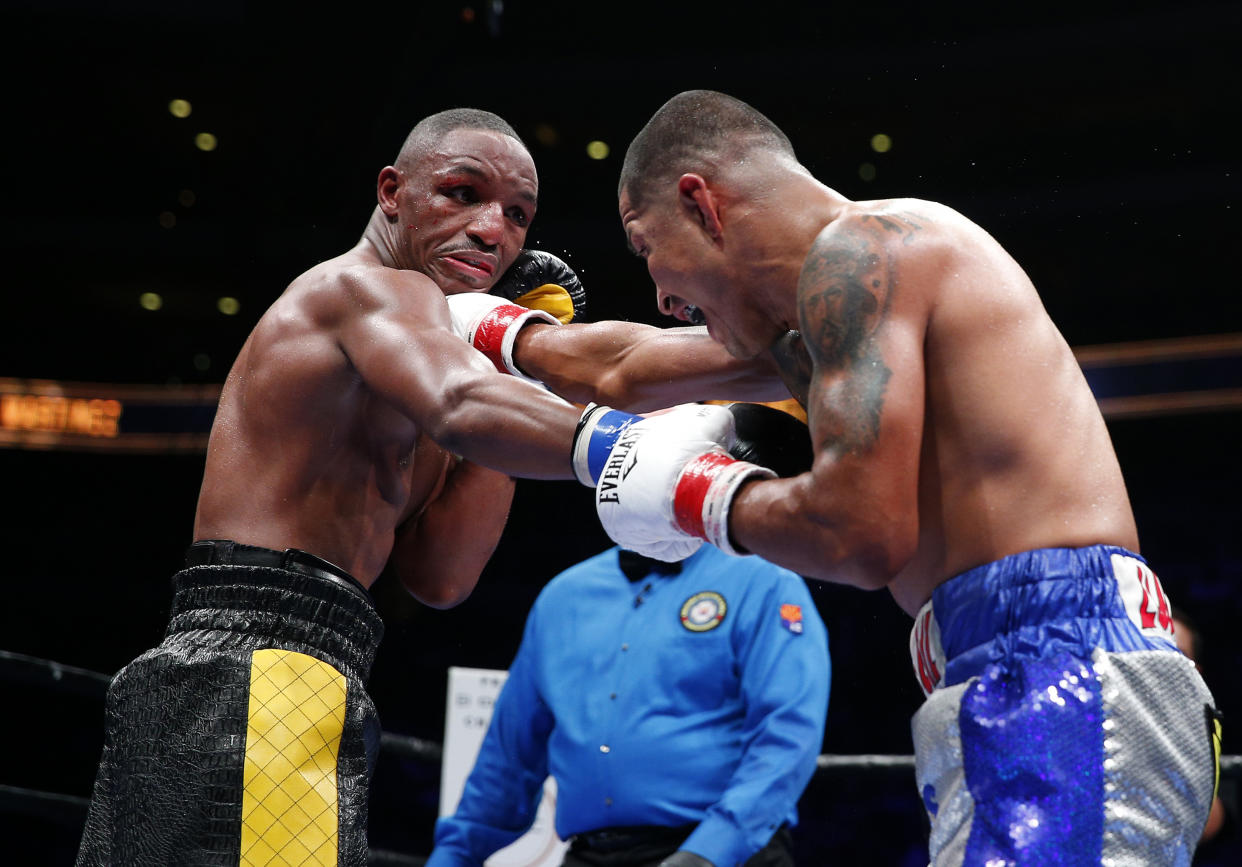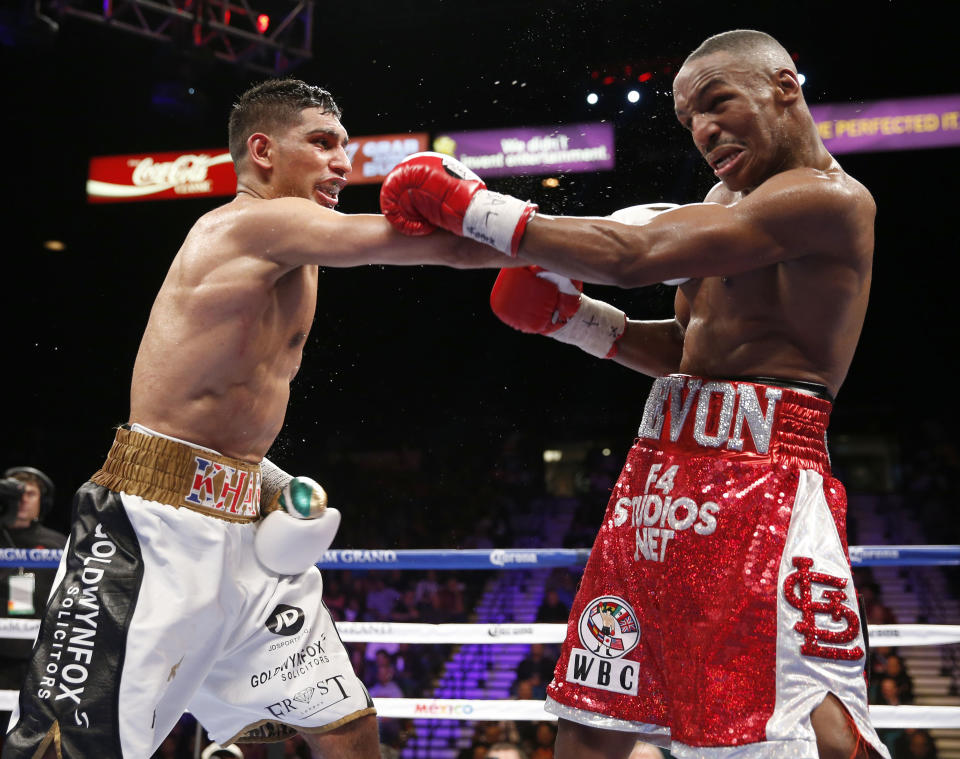How former world champ Devon Alexander KO’d his opioid addiction

Devon Alexander said it sometimes still amazes him that he wound up addicted to an opioid.
The former world champion was notable for having grown up in the rough Hyde Park section of St. Louis, surviving mean streets that took the lives of so many boys and young men whom he started with in boxing.
Alexander was a marvelous athlete who won his first 21 pro fights, captured the IBF and WBC super lightweight championships and was a role model to youth for the way he lived his life.
He never drank alcohol and still hasn’t.
“Not even a sip of beer,” said his trainer, former St. Louis police officer Kevin Cunningham. “Not one sip ever crossed his lips.”
He has never smoked cigarettes and still hasn’t taken a puff.
He didn’t do drugs, either. He was so clean, he didn’t take medication until after one of the most significant wins of his career, a 10-round whitewash of Marcos Maidana on Feb. 25, 2012. He had surgery to repair a blood clot on his nose that was the result of an inadvertent head butt during training camp.
Alexander was a teetotaler’s teetotaler.
And yet, there he was, addicted to the painkiller Tramadol, which he was given following his nose surgery.
*****
His career, seemingly back on the upswing after a near-shutout of Maidana, seemed to come to a screeching end. There was a loss to Shawn Porter on Dec. 7, 2013, and then another one to Amir Khan on Dec. 14, 2014. And then came the one that mystified Cunningham, the 10-round decision loss to Aaron Martinez in which Alexander looked like a shot and finished fighter.
It was a bout that the Devon Alexander of old — who began his career 21-0 with two world title belts — would have won in a rout. Instead, he was sluggish and slow and not very athletic.
Cunningham, who worked in the narcotics division for the St. Louis police before becoming one of boxing’s elite trainers, knew something was up. But Cunningham had no idea Alexander, of all people, had gotten addicted to Tramadol, an opioid.
“Being honest with you, I knew for a while, several fights prior to Martinez, that something wasn’t right,” Cunningham said. “We talked about it. Martinez is a guy that he should have beaten with one hand tied behind his back. That was at the worst of this when I knew I had to do something because there was something going on.
“But I’d noticed it in the gym several fights prior. I was continuously asking him, ‘What’s wrong?’ I knew something wasn’t right. After a while, I called [manager] Al Haymon and we got him checked out.”
They suspected he might be having a heart issue, and they sent him to the Mayo Clinic in Rochester, Minnesota, where he was examined head-to-toe and given a clean bill of health. They wondered if he had suffered a brain injury, so they sent him to the Cleveland Clinic Lou Ruvo Center for Brain Health in Las Vegas, where Dr. Charles Bernick is leading a team that is studying fighters’ brains.
He checked out fine again.
“I didn’t know what to think because I ain’t never seen nothing like that,” Cunningham said of Alexander’s quick fall from grace. “He went from being one of the elite fighters in the sport to where he dropped off so fast where he wasn’t in that elite class and [was] just a guy, just another guy.”

Alexander had begun boxing when he was 7, one of 30 boys in the original group of boxers that Cunningham put together to save them from the troubled streets in Hyde Park. It was a high-crime, drug-infested part of St. Louis, and Cunningham began the boxing program while he was a police officer as a way to keep the kids off the street.
The group, though, didn’t stay together long. Roughly a third were murdered and another third wound up in jail, Cunningham says.
Cunningham fretted over each of them, but he never had to worry about Alexander. He was the one kid whom Cunningham could trust. He showed up when he said he would and worked as hard, or harder, than anyone. He was polite to a fault and was as clean cut as they come.
As he matured, he developed into a world-class talent and Cunningham spent more and more time with him. The bond they developed was like that of brothers. Cunningham was the protective big brother who was determined not to let Alexander become another statistic.
Alexander repaid his friend’s trust by becoming one of the best fighters in the world, and the two had a long and successful relationship. After a disappointing loss to Timothy Bradley in a 2011 title unification bout, Alexander returned with impressive back-to-back wins over Lucas Matthysse and Maidana.
The victory over Maidana might have been the most impressive of Alexander’s career. It was nearly a sweep, as Alexander won all 10 rounds on two scorecards and took nine of the 10 on a third.
“That was incredible, what he did in that fight,” Cunningham said. “He boxed him so easily. Nobody had ever beaten Maidana like that, and I don’t think anyone has since. It was easy work for him.”
It’s notable that, less than two years later, Maidana fought a pair of tough bouts with Floyd Mayweather Jr. Mayweather won both of them, but neither were blowouts and Maidana doled out his share of damage.
It was vintage Alexander in the win over Maidana, a quick and slick boxer with a radar for incoming punches and a rapier-like jab.
Leaving ringside after the bout, Cunningham was satisfied, believing Alexander had regained his status after the loss to Bradley.
There was only one issue: During training, a head butt caused Alexander’s nose to swell significantly. He fought with it, because it wasn’t believed to be serious. After the bout, it was discovered he had a blood clot. Surgery corrected it and after a brief recuperative period, Alexander returned to the gym.
Right away, Cunningham knew something wasn’t right. Alexander normally fought at 147 pounds, but he was showing up to the gym at 150, which was abnormally light for him between fights.
“Kevin said to me, ‘What’s going on with your weight?’ ” Alexander said. “But I just said I didn’t know.”
He knew. He’d gotten addicted to Tramadol, which was prescribed to kill the pain following his nose surgery. He hadn’t taken medication before, but Tramadol did something to him.
“I didn’t really want to take anything, but they said I would need it, so I took it,” Alexander told Yahoo Sports. “And you know what? I began to like the feeling. When I took it, I felt a certain way and I liked that. That’s how it all starts for any addict. You like it and you want more. You like it too much and it just catches up to you.”
Even as he was falling into the throes of addiction, Alexander was aware of what was going on. He wouldn’t say a word to anyone else, but he had plenty of conversations with himself.
He knew his reputation – “I was Mister Clean,” he said, laughing – but he liked the feeling Tramadol gave him so much he didn’t care what anyone thought.
He’d keep getting his prescription refilled and, sure enough, he was addicted.
“Me being the clean person I am, I said, ‘Why would you do that to yourself,’ but the hard part of it is, until you have that happen, it’s hard to understand,” he said.
*****
The drug made him lazy, he said, and he wasn’t so interested in pushing his body to prepare for fights. Against world-class fighters, that’s big trouble.
And so he lost to Porter. And then to Khan. And then to Martinez in a fight that was a step down in class.
“When you’re in this addiction, you forget everything else, what was important to you before, your goals in life, all of that,” Alexander said. “It takes over your life.”
Cunningham was perplexed by what he saw in the gym, but he’d run out of answers. It didn’t make sense, but he had to accept the idea that perhaps at less than 30 years old, Alexander was done as a world-class boxer.
He still cared deeply for Alexander, and trained him when he came to the gym, but having had him checked out physically as thoroughly as possible, at two world-class facilities, Cunningham was at a loss.
But it became clear when his phone rang and Alexander summoned him for a meeting.
“He called me and asked me to come over to his house,” Cunningham said. “When I got there, he said, ‘Hey man, there is an issue I’ve been dealing with and I’ve been hiding it from you.’ And then he told me.
“I’ve been through so many things with fighters, but he’s the last one I ever expected would be telling me this.
“This kid was super, squeaky clean, as reliable as they ever come. But we had to do what we had to do.”
Alexander entered rehabilitation and spent eight months there getting detoxed. He gained weight, but that would be something he could shed.
After eight months in rehab, Alexander was cleared and returned to the gym on a mission. He’ll fight for the first time since his release on Nov. 21, when he meets Walter Castillo on Fox’s “Toe-to-Toe Tuesdays” card in St. Petersburg, Florida.
“I believe the sky is the limit and I’m back to win the world title again,” Alexander said.
But this time, there is an additional purpose.
“I want to be an advocate for people who are fighting an addiction,” he said. “I’m a living, breathing witness to what can happen. I want to be that voice that says, ‘It’s hard, but you can break the cycle. You can beat this and go on with your life.’ That’s what I’m fighting for.”
His relationship with Cunningham is as solid as ever, and Cunningham is now seeing the same guy he used to see in the gym: Fast, strong, hard-working and, oh, so hard to hit.
“He’s beating up world-class fighters, world champions, in the gym every day,” Cunningham said. “This is the old Devon. He’s sharp and got his stuff back.
“He’s going to do big things and he’s going to be an example to a lot of people who are dealing with this epidemic. Opioid addiction is one of the biggest crises in the country, and Devon is going to be an example to people that you can beat it and bounce back. He’s already an inspiration to the guys in the gym, and when people hear his story, he’s going to be an inspiration to people everywhere.”
More from Yahoo Sports:
• Fans’ planned Veterans Day NFL boycott backfires
• NFL star lost infant child hours before playing game
• Dan Wetzel: Meet the most dangerous man in college basketball
• Pat Forde: What went wrong for Butch Jones at Tennessee


